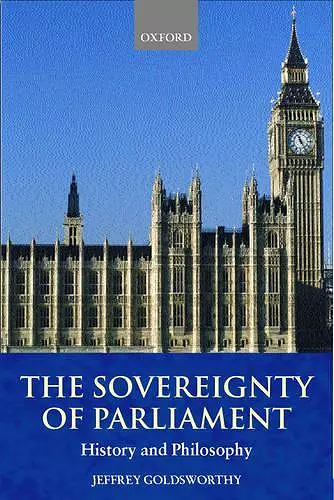The Sovereignty of Parliament
History and Philosophy
Format:Hardback
Publisher:Oxford University Press
Published:29th Jul '99
Currently unavailable, and unfortunately no date known when it will be back
This hardback is available in another edition too:
- Paperback£56.00(9780199248087)

The doctrine of parliamentary sovereignty has long been regarded as the most fundamental element of the British Constitution. It holds that Parliament has unlimited legislative authority, and that the courts have no authority to judge statutes invalid. This doctrine has now been criticized on historical and philosophical grounds and critics claim that it is a relatively recent invention of academic lawyers that superseded an earlier tradition in which Parliament's authority was limited to common law. The critics also argue that it is based on a misunderstanding of the relationship between statutory and common law, and is morally indefensible. The Sovereignty of Parliament: History and Philosophy responds to these criticisms. It first defines and clarifies the concept of legislative sovereignty and then describes the historical origins and the development of the doctrine from the thirteenth to the end of the nineteenth century. Professor Goldsworthy goes on to identify many different reasons why persuaded statesmen, lawyers, and political theorists have endorsed the doctrine. He discusses the ideas of a large number of legal and political thinkers, including Fortescue, St German, Hooker, Coke, Bacon, Parker, Milton, Hobbes, Hale, Locke, Bolingbroke, Blackstone, and Burke. He shows that judges in Great Britain have never had authority to invalidate statutes, and that the doctrine is much older than is generally realized. The book concludes by dealing with philosophical criticisms of the doctrine. Combining the insights of earlier thinkers with those of contemporary legal philosophers, it demonstrates that these criticisms are based on a defective understanding of the nature and foundations of law, and of the relationship between legislative authority and the common law. It argues that the doctrine is morally defensible, and refutes the thesis that the judges have authority to modify or reject it.
Professor Goldsworthy has written an important and valuable book, and historians of English political thought will find in it a broad and thoroughly informed account of the development of ideas on parliamentary sovereignty. * History of Political Thought *
The historical arguement is persuasively made ... * Geoffrey Marshall, TLS *
Jeffrey Goldsworthy of Monash University now looses a vigorous counter-blast on both the historical and philosophical fronts. * Geoffrey Marshall, TLS *
Goldsworthy's use of secondary sources and his scholarship are admirable. The style may be allusive, but it is nonetheless very readable and his arguments in the chapter dedicated to the philosophical foundations of the doctrine are clearly written and accessible. * Patrick Birkinshaw, THES. *
This valuable book will be found challenging by the critics of parliamentary sovereignty. In its mild and persuasive way, it leaves their arguments in shreds ... This book will prove impossible to ignore in that debate; Indeed, its arguments will dominate it. * Christopher Forsyth, The Cambridge Law Journal 2000 *
ISBN: 9780198268932
Dimensions: 242mm x 163mm x 22mm
Weight: 631g
330 pages